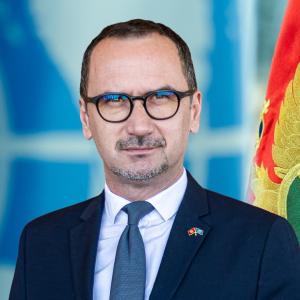In a bid to improve the quality of life of young people in Montenegro, the UN System has launched – in close partnership with the Government – an innovative programme to upgrade the quality of education, employability and future job performance.
“It is a socially transformative programme that seeks to turn around the biggest problems in the country, such as: apathy, fatalism and determinism,” said former UNICEF representative in Montenegro, Benjamin Perks. “The aim is to help young people become more optimistic and use the entrepreneurial spirit in addressing problems in their communities,” he added.
One of the results of the programme is the Youth Strategy, the Montenegrin government’s response to the youth development. UN support has enabled participation of all the relevant stakeholders, especially young people, backed by international expertise and innovative methodologies.
“The vision of the Youth Strategy is that Montenegro should be a country where young people are autonomous, involved in decision making and have decent jobs”
Nenad Koprivica, the head of the Directorate for Youth in the Ministry of Sport
Koprivica points out that this strategy works towards higher-quality education and solving the issues of youth employment and participation, clearly positioning Montenegro’s youth as one of the country’s greatest potentials. Moreover, the UN has been supporting adoption of the set of rules which has enabled implementation of the strategy through the financing of local youth organisations’ projects.
“Within the public competition, 36 projects were funded to improve the education, training, employability and overall quality of life of young people in Montenegro,” Koprivica said. He stressed that the UN is one of the key actors involved in improving the position of youth, also thanking the UN for its instrumental support towards establishing the Youth Centre in the capital of Montenegro.
Around 12,000 young people have been reached and involved in the UN Youth Programme through the Youth Innovation Lab and other initiatives aimed at supporting skills development. The Upshift initiative provides young people with skills and knowledge to define and work on some of the most pressing social challenges. Through the Sebi zelim (I wish for myself) initiative, the participants define their aspirations and develop social and emotional skills, such as perseverance, empathy, ethics.
“This programme has definitely empowered me to recognise my potentials and aspirations, but also define my personal goals for the future”
Stana, a 17-year-old participant of Sebi zelim (I wish for myself) initiative
Just as importantly, a programme for developing students’ socio-emotional skills is currently being implemented in 10 primary schools and with the potential to be expanded in the period to come. Due to the efforts of the UN system, socio-emotional and 21st-century skills are becoming an integral part of mainstream education. However, it will not be easy for Montenegro’s young people and their counterparts from the rest of the Western Balkans to accelerate their progress and get closer to the educational results of their peers in Western Europe.
The latest PISA testing for 2015 indicated that young people in Montenegro demonstrate poor educational outcomes, placing their country far behind countries with a high performance in education such as Slovenia, Finland or China.
“Countries like Finland, Estonia and even Slovenia are reforming quickly to help pupils acquire the 21st-century skills needed for the global economy. Their interventions are based on the latest science concerning brain development. We need to reform the education sector quickly to catch up, otherwise, today’s 15-year-olds may be much poorer when they are 40 than today’s 40-year-olds,” Perks said. He reminded that the initiative named Prilike was piloted in Montenegro last year, in cooperation with the Government, enabling 500 high-school students to experience real work settings in 50 companies. Perks also said that this initiative should be “a good example of a model directly linking the education system and the labour market”.
Adolescents who participated in the programme consider it a great opportunity to learn how to build their skills and choose the career they want, to secure a brighter future for themselves in the country.
“I think this is the first time that someone in Montenegro has asked young people what they really want,” said 19-year-old Jovana, one of participants of the programme.
The UN and Montenegro’s officials know that accelerating the development of young people towards a better future is undoubtedly a complex task that cannot be achieved through a single intervention.
However, every step forward matters. Many dots have been connected so far, with youth increasingly taking their future into their own hands, marking just the beginning of a journey towards a brighter tomorrow.






